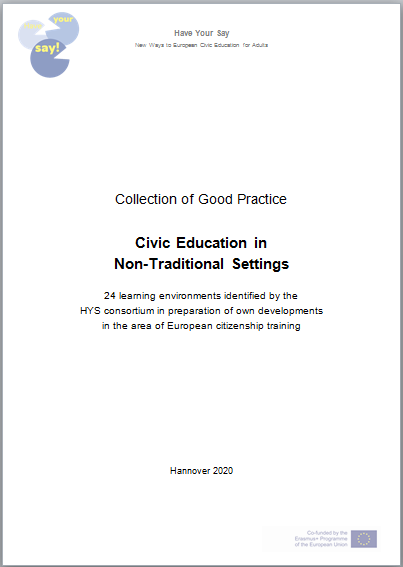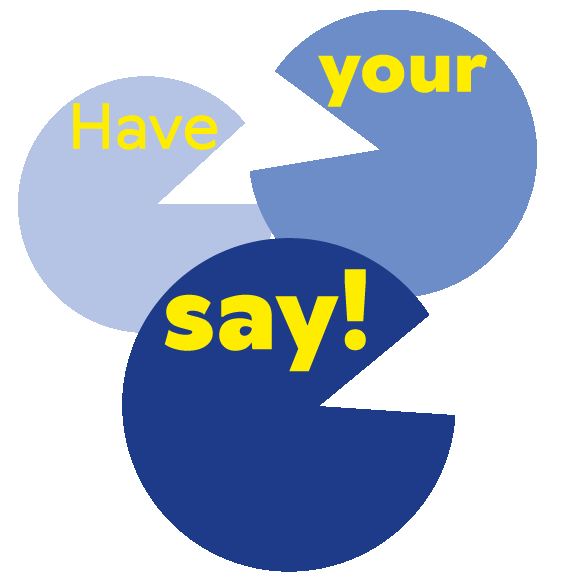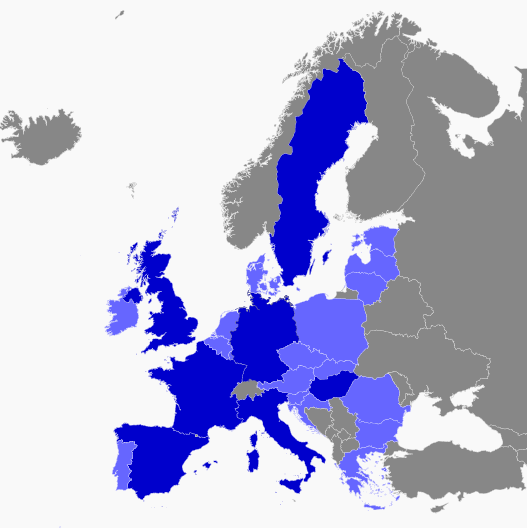This book presents reports about learning environments created by organisations in 7 European countries for helping people – particularly adults – improve their understanding of politics, the way how decisions are made in a democracy, and last but not least the idea and functioning of the European Union.
The collection reflects the state of the art in about 2019 or early 2020. That’s when our “Have Your Say” project started. In this project we wanted to create low-level learning opportunities for adults that would help them develop a better understanding of the EU, possibly facts-based rather than myths-based, but leaving it open to them to draw their own conclusion whether the EU is a good or bad idea.
This book is the result of our first activity in the project: looking around to see what others had done that would help us in our task. “Others”, this means: other organisations involved in educational activities, particularly with adults. “We”, that’s staff of 8 providers of adult education from seven European countries: Germany, Italy, Spain, Hungary, France, Sweden, and – interestingly – the United Kingdom which had just recently taken the decision to leave the EU, and did so during the three years implementation period of our project.
The task for the teams in all 7 countries was to identify a number of games, workshops, seminar concepts, scenario games and so on that would match our intention and could serve as interesting examples to learn from. In a co-operative process of discussions and assessments, we identified then 3-4 per country (twice as much for Germany) that seemed most interesting to us.
In this book we present the 24 approaches selected.

Contents
These are the examples covered (and page numbers in the book)
Where is Mika? - Escape room - P. 14
In the Where is Mika escape room, players have the task to find a disappeared girl, Mika. They have to rummage through the belongings she left in her room when she disappeared, and the task is to draw the right conclusions in order to eventually find out where she has gone. As all educational escape rooms, Where is Mika helps players develop their cognitive and social skills, not least through practicing team work.
Fortress Europe - Simulation game - P. 19
This simulation game is very much in the centre of the idea oft he HYS project: to lead learners (or who ever participates) into a process of getting to know the Europan Union as an institution, and start to form their own position about it, possibly as a side-effect of pleasant activities in cooperation with others. The downside of this example is that it requires relatively high-skilled students
Legislativity - Board Game - P. 25
A typical board game, with a cardboard playground and various utensils such as meeples, dice, and cards introducing various surprising events or circumstances into the game. Can be played by up to 8 players, or more when they form teams. Each team tries to move their bills (proposals for new laws) through the EU legislation procedure. The learning objective of the game is to get familiar with the EU legislation procedure.
Pimp your town. - Simulation game - P. 29
In the simulation game Pimp Your Town! students get to know the processes in municipal politics in an action-oriented and sustainable manner, they can also bring their own ideas into local politics.
Pimp my science - Simulation game - P. 33
The science game “Pimp my Science” was developed based on the simulation game Pimp your Town (see above). Pupils work with experts, write proposals on the topic of science and discuss them, supported by politicians. This creates a public dialogue about diverse aspects of science.
Immigropoly - Online game - P. 37
An online game exploring the subject of migration, which incorporates an educational element developed by the ID Research workshop, PĂ©cs, Hungary. The game provides for a unique experience in addressing issues of immigration and integration. It is available in Hungarian and in English.
Migrantas - Arts & design workshop - P. 41
Migrantas is an initiative of artists and designers in Berlin. They use visual arts and graphic design in workshops for other migrants (mostly women), helping them to create drawings reflecting their life journey. The drawings are then condensed into pictograms and distributed in public spaces.
Sociopoly - Board game - P. 45
Sociopoly presents gamers with a small town in northern Hungary. Players are put into the roles of various people in the village, belonging to different classes, and let's the live through four weeks of village live, while having to make to with the resources and obligations their roles are provided with.
Europa=noi - Online learning environment - P. 49
Europa=noi is a large online learning environment about the European Union. It offers a journey to discover European history, values, institutions and programmess, with a focus on the rights and duties associated with citizenship and the European treaties. Available for Italian-speaking users.
Essereuropei - Series of events in a city - P. 53
Essereuropei (“To be Europeans”) was a sequenze of educational events organised by the municipality of San Lazzaro di Savena (Bologna) in autum 2019. It involved 150 students over a period of 4 months, and made them participate in workshops, a photo contents, video production, etc.
Learning Legality - Series of events - P. 57
The social cooperative Lai Momo in Bologna organized a series of educational events for Asylum seekers. Especially interesting (from the perspective of European citizenship awareness) were meetings with police officers and legal experts to make newcomers to the country familiar with the legal system, especially regarding labour law and interpersonal relationships. Different groups of asylum seekers took different lessons from it, mostly depending on their country of origin.
Community Art - Arts and self confidence - P. 63
Adult students with little formal education go through a process of creating works of art to gain confidence. They do this in parallel with children from primary school. - At first glance it may seem that this activity is little related to European citizenship training, but CEPA San CristĂłbal, through its various life-history related activities showed us that citizenship (European or other) needs self-aware and self-confident citizens, and offering low-skilled adult learners opportunities like this helps them gain confidence and awareness.
Getting to Europe friends - Classroom activity - P. 68
Getting Europe friends is a classroom activity developed by CEPA San Cristóbal adult education centre in Tenerife. A group of students – young adults with very low formal education – is encouraged to collect basic information about a number of European countries (chiefly via online research), to structure this information, and eventually to produce video clips to present these countries to their classmates.
Who is who, and why do you think so? - Classroom activity - P. 73
Using a multimedia application programmed for the purpose (available via internet), students are shown photographs of various people, both unknown ordinary persons and celebrities. They are asked to associate with these photographs various characteristics of personality, and professions or occupations. This is then used to start a discussion about prejudices, to start self-reflection, and to become aware of traces of racism,. and of questions of societal integration. The relation to European citizenship training is again on the level of building up awareness, including awareness for (and appreciation of) diversity.
Human Rights in Practice. 78
Board game to help newly arrived immigrants become aware of human rights. The game consists of seven sections with different themes that all relate to Swedish society. These themes are developed to help newly arrived immigrants to orient in their new home country. Themes that are being discussed are for example family, health and education.
No Alternative Facts. 84
Online learning platform created as part of an Erasmus+ project by partners from several countries, offering various materials to learn about fake news, how they are created, and how they can be detected. Everybody can easily register and use the materials. The type of material is what e-learning platforms nowadays usually offer, with various tasks, activities, badges to earn, etc.
RĂĄdet (The Council) - Role game - P. 89
This role game is about democratic systems and political development. It uses a scenario of an all-inhabited galaxy, with many independent planets. Players are put into a role of representatives of these planets who, at a meeting, have to take common decision. The aim of the role-play is to encourage participants to act in a way that makes them take decisions in regards to what is best for their planet and coalition. This all, of course, invites to drawing parallels to the European Union.
Create your own propaganda - Classroom activity - P. 95
Stereotypes and propaganda are everywhere in society. Helping learners to notice them will help them to be careful with interpreting. This activity let’s learners in teams create their own “propaganda”, together with various arguments to distribute it and make it plausible to others. In this playful way, learners become aware of the phenomenon and start to become a bit more immune against propagandistic attacks.
Make your own slogan. - Classroom activity - P. 98
A classroom activity to make students aware of the power of slogans and the possibility to seduce people. After getting familiar with the notion of “slogan”, students select subjects for slogans to be created for, and then, in small teams, create slogans for them. With respect of European citizenship training this method can be interesting in order to raise awareness for the power of political slogans, especially when used by malignant actors.
Citizen Debate. 101
A classroom activity for training free speech and civilized debate in a save environment.
Ealing Mediation Service Training. 103
The West London Equality Centre offers trainings (of various length) to citizens who want to become mediators in their neighbourhood to help resolve conflicts. This can well be seen as a contribution to citizenship and building up a civilized society.
Legal Training for Everybody. 107
The West London Equality Centre offers workshops on a weekly basis where everybody interested in the legal system and the law can attend for free. Lecturers are practitioners of law, including solicitors, barristers, judges, and university professors. Thousands have participated in the trainings, and many have profited from it in their personal development.In the context of the Have Your Say project, the aspect of delivering legal training on a grassroots level is especially interesting, as knowing the laws and the legal system of a country is crucial for good citizenship.
The Street Mission’s coaching and training sessions. 110
Training offers for homeless in various public locations in London, combined with other forms of help, e.g. providing food and other necessary products as well as legal consultation.
Download
Collection of good practice (Pdf, 7 MB)











